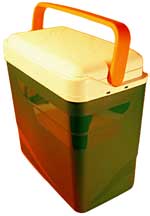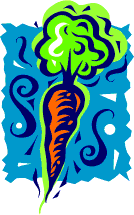Food Safety Tips
Top 12 For All Occasions
- Cook meats, poultry, dressings, gravies, and casseroles to 165°F. Cook eggs to 145°F or above and ground meat to 158°F.
- Maintain cold foods at 45°F or below in storage.
- Maintain hot foods at 140°F or above.
- Use a metal probe thermometer to take temperatures of food.
- Wash your hands often with warm soapy water.
- Never use the same knife to cut raw meats and then ready to eat foods like vegetables and sandwich meats.
- Always thaw meat in the refrigerator, NOT on the kitchen counter.
- Always use a clean plate to serve cooked foods.
- Refrigerate leftover foods in small shallow containers promptly after serving.
- Reheat leftovers to 165°F.
- Clean cutting boards between different foods.
- Wash fruits and vegetables with potable water before using.
- Follow these 12 Food Safety Tips to provide safe food for your family and friends.
野餐安全
 Memorial Day weekend is the beginning of the picnic season. The Tompkins County Health Department recommends some basic food safety practices to ensure that your picnics and barbecues are safe and enjoyable.
Memorial Day weekend is the beginning of the picnic season. The Tompkins County Health Department recommends some basic food safety practices to ensure that your picnics and barbecues are safe and enjoyable.
Make food shopping the last errand. Immediately place foods in your ice chest or insulated cooler with ice packs. Place any raw meats in a separate cooler so that blood juices do not drip on other foods that are ready to eat and will not be cooked (salads, cold meat for sandwiches, puddings, vegetables etc.).
Make all picnic salads with cold ingredients (below 45°F). Keep cold salads cold. Transport salads in insulated coolers with cold packs.
Wash your hands before preparing foods and between preparing different types of foods. Wash utensils and cutting boards before use and between preparing different types of foods. When on a picnic take soap, water and disposable washcloths in case there are no cleaning facilities nearby.
Cook all foods thoroughly.
Bring a Chef’s Thermometer to ensure your meat products are thoroughly cooked. Undercooked meats may cause illness
- Cook hamburgers to an internal temperature of 158°F.
- Cook poultry to an internal temperature of 165°F.
- Cook pork to an internal temperature of 150°F.
- Cook rare roast beef to 130°F.
Eating the food immediately after cooking is recommended. Discard unrefrigerated leftovers to prevent illness. Foods left at room or summer air temperatures will cause massive bacterial growth and possibly cause you, your family and guests to become ill.
Fire safety is also very important when cooking outdoors. Make sure your grill or fireplace is away from any flammable objects, including your house, camping equipment, trees, picnic table and lighter fluid. Keep children and pets at a safe distance from the cooking area and NEVER use gasoline to start your fire. Keep a fire extinguisher, sand or a bucket of water near the cooking site. Extinguish the fire before leaving the area.
Enjoy safe picnics and barbecues throughout the summer!
夏季沙拉安全
 Picnic time is here. It’s time to pack up all those great homemade foods and salads and head for the great outdoors to enjoy the beautiful summer weather. Today, restaurant patrons and picnickers alike continue to suffer from food borne illnesses related to improper preparation and refrigeration techniques used to prepare and serve outdoor summer meals. Many picnic foods contain large quantities of protein, (eggs, tuna, ham and other meats are examples of high protein foods), and therefore can support rapid growth of disease causing bacteria.
Picnic time is here. It’s time to pack up all those great homemade foods and salads and head for the great outdoors to enjoy the beautiful summer weather. Today, restaurant patrons and picnickers alike continue to suffer from food borne illnesses related to improper preparation and refrigeration techniques used to prepare and serve outdoor summer meals. Many picnic foods contain large quantities of protein, (eggs, tuna, ham and other meats are examples of high protein foods), and therefore can support rapid growth of disease causing bacteria.
Simple steps for preparing and serving safe summer salads:
- Pre-chill (to 45°F or less) all salad ingredients before mixing them together
Make sure all potatoes, tuna, eggs and mayonnaise are cold. Cook potatoes, macaroni and eggs one day ahead (quick rinsing is not adequate). Pre-chill canned tuna overnight in your refrigerator. Cool other ingredients overnight in the refrigerator in shallow pans. - Use cold celery, peppers, onions etc.
- Use cold rinsed shrimp.
- Use cold refrigerated mayonnaise. Mayonnaise by itself is not the cause of food related illness. It is the tuna, ham or eggs that may contain organisms that give people the queasy, upset stomach, often followed by vomiting and diarrhea.
- Mix all cold ingredients just prior to service time, NOT a day ahead.
- DO NOT use your hands to mix tuna or other salads. If a large spoon is not effective, use food grade gloves to avoid touching the food. (After mixing the cold salad ingredients, immediately refrigerate the salad in small, shallow pans).
- Transport all your cold picnic salads in a cold ice chest with cold packs to keep those cold foods cold on hot summer days.
- Do Not transport your salads in the same cooler with the raw meats. The prepared salads will not be cooked and may contain bacteria from the meat juices. Use separate coolers for raw meats and ready to eat foods.
- Pre-chill your insulated cooler. If possible place your cooler in the refrigerator over night with the lid off for chilling. Place enough cold packs in the cooler to keep all the food cold.
MAKING SANDWICHES? - USE COLD BREAD
Turkey Safety Tips
The Tompkins County Health Department recommends that you protect yourself, your family and your friends by following these 10 safe turkey tips.
Separate Foods - Don’t Cross-Contaminate
- When you shop, keep the turkey away from ready to eat foods in your shopping cart.
- Place the turkey below all ready to eat foods in your refrigerator to prevent other foods from becoming contaminated with juices from the raw turkey.
- Use separate cutting boards for cooked foods and raw foods.
- Never put the cooked turkey on the unwashed plate that previously held the uncooked turkey.
CLEAN your hands and food surfaces often.
- Wash your hands with hot soapy water before you touch the turkey and after you use the bathroom, cough, sneeze or otherwise contaminate your hands.
- Wash all cutting boards, dishes, kitchen tools and counter tops after you finish fixing the turkey.
COOK foods to safe temperatures.
- Cook the turkey thoroughly. Use a food thermometer to check for doneness.
- Cook the whole turkey unstuffed to 165 degrees F. at the thickest part.
CHILL foods promptly.
- It is best to thaw the turkey in the refrigerator NOT at room temperature. Refrigerate all leftovers immediately after your meal.
- Split large amounts of leftovers into smaller amounts and cool them in the refrigerator.
For more information on food safety call Carol Chase at the Tompkins County Health Department, Environmental Division, 274-6688.
內容更新 10/21/2004

